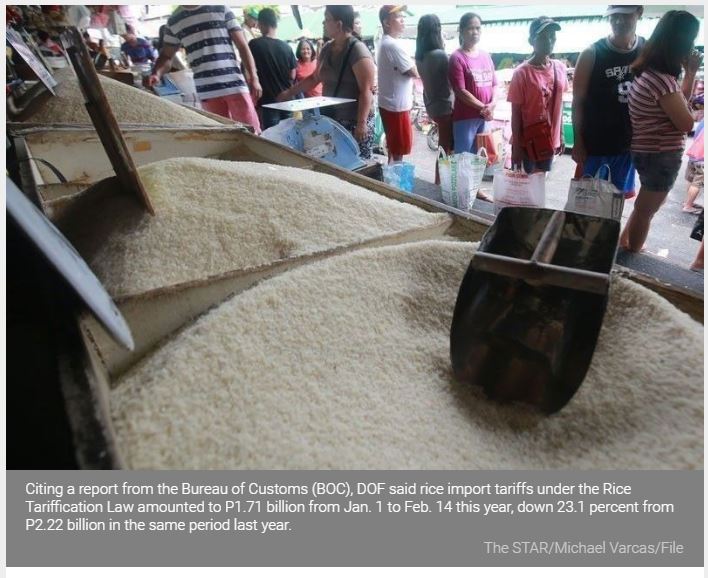Philippines: Rice tariff collection drops to P1.71 billion
MANILA, Philippines — Revenues generated by the government from the collection of rice import tariffs went down to P1.71 billion in the first one-and-a-half months of 2020 as the volume of rice shipments declined, the Department of Finance (DOF) said yesterday.
Citing a report from the Bureau of Customs (BOC), DOF said rice import tariffs under the Rice Tariffication Law (RTL) amounted to P1.71 billion from Jan. 1 to Feb. 14 this year, down 23.1 percent from P2.22 billion in the same period last year.
The DOF said collections declined as the volume of rice imports during the period dropped by 61.8 percent to 209,320 metric tons (MT) as compared to the 759,810 MT brought into the country during the same period last year, when the RTL was not yet in effect.
Republic Act 11203 or the Rice Tariffication Law imposed a minimum tariff of 35 percent on rice imports effective March 5 last year in lieu of quantitative restrictions (QRs).
Proceeds from rice tariff collections will be earmarked for the P10-billion Rice Competitiveness Enhancement Fund (RCEF), which will be used to provide cheap credit, high quality seeds, agricultural machinery and skills training to rice farmers.
Last year, the BOC collected P12.3 billion under the law as private traders imported 2.03 million MT of rice.
With over P12 billion in tariffs collected, Finance Secretary Carlos Dominguez said excess funds would enable the government to immediately extend direct aid to farmers, in order to make farm production more efficient.
On top of paying tariffs, rice importers are also required under the law to secure sanitary and phytosanitary import clearances from the Department of Agriculture’s Bureau of Plant Industry.
“This requirement will ensure that rice imports are free from pests and diseases that could affect public health and local farm production,” the DOF said.
According to the DOF, the average retail cost of rice has declined by at least P9 per kilogram since the liberalization of rice imports.
The agency said the generation of revenues from rice imports was also a complete reversal of the previous rice trade regime, when the National Food Authority acted as the regulator of rice imports and chief importer of the grain.
The DOF said the NFA incurred a total of P187 billion in tax subsidies from 2005 to 2015, or an average of P19 billion a year.
Finance Undersecretary and chief economist Gil Beltran also pointed out that the NFA lost around P11 billion annually before the law was enacted.
Source: https://www.philstar.com/business/2020/02/25/1995758/rice-tariff-collection-drops-p171-billion


 English
English




